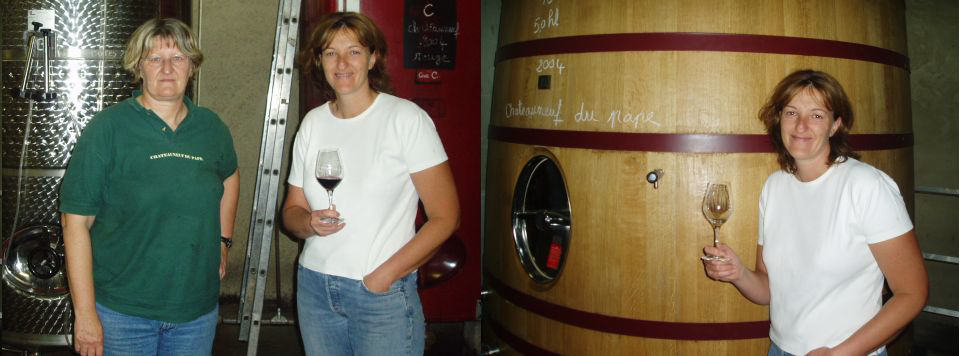|
Domaine de Marcoux
Catherine and Sofie Armenier
198 Chemin de la Gironde, 84100 Orange
Tel. +33 490 346 743
Direct sale: Yes by appointment. For sale at
Vinadea
Mail: info@domaine-marcoux.com
Web: http://www.domainedemarcoux.fr


The Armenier family has been present in
Chateauneuf du Pape for centuries.
Until the late 1990's Marcoux was run by Phillipe Armenier. The bio-dynamic principles
inspired by Rudolf Steiner ment very much to him. The planning of the work
in the vineyards and the cellars were done out from the phases of the lunar
cycle. In connexion with this the practice in the vineyards of course was
(and stil is) strictly organic. Suddenly Phillipe Armenier left the domaine
- and France. Today he lives in California. Since Philippe left France the
domaine has been run by his two sisters Catherine and Sofie Armenier. They are perhaps not quite as
focused on stars and planets as Phillipe but bio-dynamic principles also
means a lot to them. Catherine is responsible for the vineyards and Sofie for
the vinification. Sophie's son Vincent Estevenin also works at the domain
since a few years.
Marcoux covers 17.5 ha of Chateauneuf du Pape, 0,85 ha of them with white varieties. The average age is about 50 years.
5.5 ha are 60-110-years-old. Half of these old vines are used for Vieilles Vignes. The rest goes to the classic cuvée.
From 2 ha in Orange is made Cotes du Rhone and furthermore Lirac from 7 ha of
this appellation. They are situated in Saint Laurent des Arbres.
The vineyards in Chateauneuf du Pape and Orange have been certified agriculture
biologique since 1991. Those of Lirac since 2010.
Wines according to website December 2020
Price range (at Vinadea) 40-50€ +V.V. 110€
Chateauneuf du Pape
2018: 80% Grenache, 10% Mourvedre, 7% Syrah
and 3% Cinsault.
Vinification in cement tanks and maturing is mainly done here but a
part of the cuvée is aged in barrels of 350 l.
Chateauneuf du Pape Vieilles Vignes
2018: 100% Grenache. Mixed planting with some Mourvedre and other varieties.
Tht vines are grown at two different lieux dits, 2,32 ha at Charbonnières
planted 1900, 1,13 ha at Les Esqueirons planted in 1900 and in 1949.
Aged in wooden casks for 18 months. Max. 4000 bottles made. The rest of the wine are used for the classic cuvée. Chateauneuf
du Pape Blanc
2018: 65% Roussanne and 35% Bourboulenc. (from 2020 also
Clairette)
Roussanne is from 0,5 ha at
Les
Esqueirons, planted in 1987 and Bourboulenc from 0,35 ha at Les Bosquets
planted in 1982. Chateauneuf
du Pape Blanc
2018: 65% Roussanne and 35% Bourboulenc. (from 2020 also
Clairette)
Roussanne is from 0,5 ha at
Les
Esqueirons, planted in 1987 and Bourboulenc from 0,35 ha at Les Bosquets
planted in 1982. Cotes
du Rhone
2018: Grenache, Syrah and a bit Mourvedre. Lirac La Lorentine
2018: 50% Grenache, 25% Syrah and 25% Mourvedre.
VDF Raisin de Loup
Grenache, Syrah, Caladoc. VDF Blanc Raisin de Loup
100% Clairette Rose from Saint Laurent des Arbres
Only 800 bottles are made.
|





